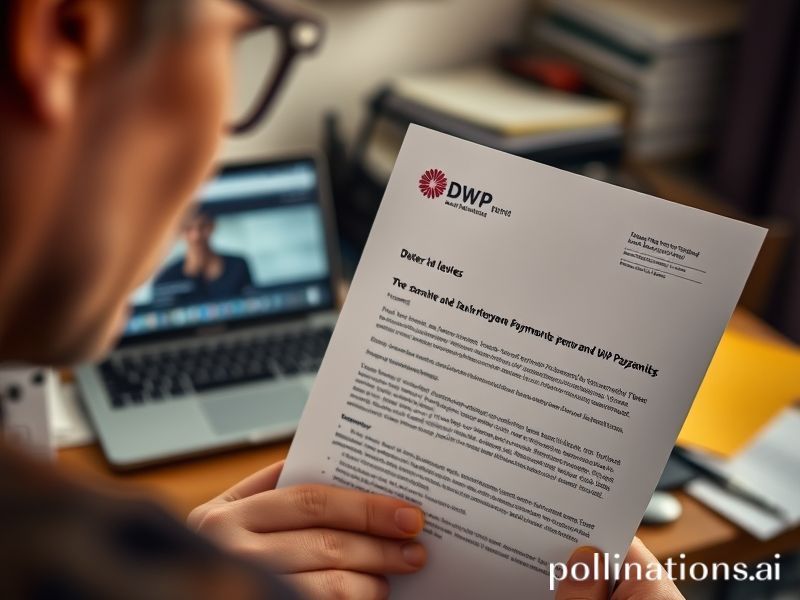DWP PIP News: Why the UK’s Disability Benefits Drama Has the Internet in a Frenzy
# **DWP PIP News: Why the UK’s Disability Benefits Drama Has the Internet in a Frenzy**
In the vast, chaotic landscape of the internet, trends come and go like London buses—some are quick and forgettable, while others are packed with drama, delayed, and leave a lasting impact. Enter the **DWP PIP news**, a topic that’s been trending globally, sparking debates, memes, and even a few tears. But what’s the fuss all about, and why should you care? Let’s dive in.
### **What’s the DWP PIP Drama About?**
For those not in the UK, let’s break it down. The **Department for Work and Pensions (DWP)** is the government body responsible for welfare, pensions, and, crucially, **Personal Independence Payments (PIP)**. PIP is a benefit designed to help people with long-term health conditions or disabilities cover the extra costs of living. Sounds straightforward, right? Well, not quite.
Recently, the DWP has been under fire for its handling of PIP assessments, with countless claimants reporting unfair rejections, bureaucratic nightmares, and even life-threatening consequences. Stories of people losing their homes, struggling to afford essentials, or being forced into impossible situations have flooded social media, turning this into a full-blown cultural moment.
### **Why Is This Trending Globally?**
1. **The Power of Social Media**: The internet has a way of turning local issues into global conversations. Hashtags like **#DWPFail** and **#PIPFail** have been trending, with users sharing their horror stories, memes, and even satirical takes on the situation. Twitter, Reddit, and TikTok have become battlegrounds for advocacy, with disabled activists and allies rallying against the system.
2. **Austerity’s Lingering Shadow**: The UK’s austerity measures have been a hot topic for years, and the DWP’s handling of PIP is seen by many as a symptom of a much larger problem. The idea that the government is failing its most vulnerable citizens resonates far beyond British borders, especially in countries grappling with similar welfare crises.
3. **The Human Factor**: At its core, this isn’t just about policy—it’s about people. The personal stories of those affected by PIP rejections are heartbreaking, and they’ve struck a chord with people worldwide. The internet loves a good underdog story, and right now, the underdogs are fighting for their right to basic dignity.
### **Cultural Impact: Memes, Misinformation, and Movements**
As with any trending topic, the DWP PIP news has spawned its fair share of memes, satire, and even misinformation. Some of the most viral content includes:
– **The “PIP Assessment Bingo” meme**: A satirical take on the absurd questions asked during assessments, turning a frustrating process into a darkly humorous game.
– **The “DWP vs. Reality” meme**: Comparing the DWP’s official statements with the lived experiences of claimants, highlighting the stark contrast between policy and reality.
– **The rise of activist accounts**: Disabled influencers and activists have gained massive followings by sharing their experiences and advocating for change, turning personal struggles into a collective movement.
### **Why This Matters**
The DWP PIP news isn’t just a fleeting trend—it’s a reflection of deeper societal issues. It’s about **accessibility, fairness, and the moral responsibility of governments to protect their citizens**. It’s also a reminder of the power of the internet to amplify voices that might otherwise go unheard.
For those outside the UK, this trend serves as a cautionary tale. Welfare systems worldwide are under pressure, and the way the UK handles its most vulnerable could set a precedent for other countries. It’s a wake-up call to demand better, to fight for justice, and to ensure that no one is left behind.
### **The Bottom Line**
The DWP PIP news is more than just a hashtag—it’s a movement. It’s a fight for dignity, fairness, and basic human rights. And as the internet continues to rally behind this cause, one thing is clear: the world is watching, and the pressure is on for change.
So, whether you’re a meme lover, an activist, or just someone who cares about justice, this is a trend worth following. Because sometimes, the most important conversations happen online—and this is one of them.
—







